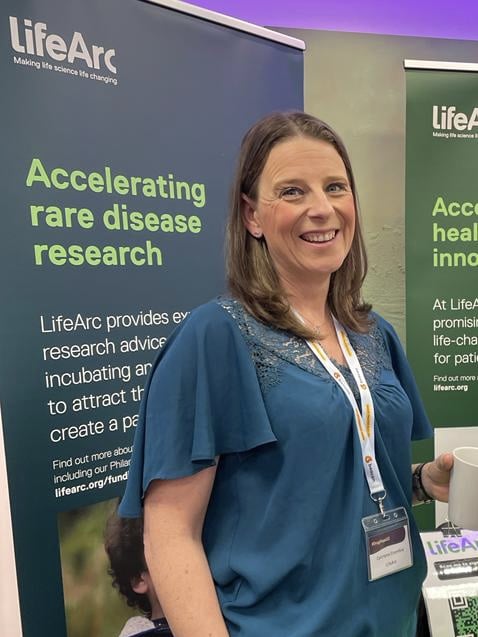Thousands of people living with rare medical conditions will get access to improved tests, treatments and potentially cures, thanks to the creation of four new LifeArc Translational Centres for Rare Diseases.
The virtual centres will focus on areas where there are significant unmet needs. They will tackle barriers that ordinarily prevent new tests and treatments reaching patients with rare diseases and speed up the delivery of rare disease treatment trials. The centres will bring together leading scientists and rare disease clinical specialists from across the UK for the first time; encouraging new collaborations across different research disciplines and providing improved access to facilities and training.
Globally, there are more than 300 million people living with rare diseases. However, rare disease research can be fragmented. Researchers can lack access to specialist facilities, as well as advice on regulation, trial designs, preclinical regulatory requirements, and translational project management, which are vital in getting new innovations to patients.
Dr Catriona Crombie, Head of Rare Disease at LifeArc, says: “We’re extremely proud to be launching four new LifeArc Translational Centres for Rare Diseases. Each centre has been awarded funding because it holds real promise for delivering change for people living with rare diseases. These centres also have the potential to create a blueprint for accelerating improvements across other disease areas, including common diseases.”
The LifeArc Centre for Rare Respiratory Diseases is a UK wide collaborative centre co-created in partnership with patients and charities, led by Professor Kev Dhaliwal, Professor of Healthcare Technology at the University of Edinburgh, Institute for Regeneration and Repair and Honorary Consultant in Respiratory Medicine, NHS Lothian. The Centre is a partnership between Universities and NHS Trusts across the UK, co-led by Edinburgh with Nottingham, Dundee, Cambridge, Southampton, University College London and supported by six other centres (Belfast, Cardiff, Leeds, Leicester, Manchester and Royal Brompton). For the first time ever, it will provide a single ‘go to’ centre that will connect children and adults with rare respiratory disease with clinical experts, researchers, investors and industry leaders across the UK. The £9.4M centre will create a UK-wide biobank of patient samples and models of disease that will allow researchers to advance pioneering therapies and engage with industry and regulatory partners to develop innovative human clinical studies. This will significantly boost the capacity and reputation of UK translational medicine, public awareness of the realities of living with rare respiratory diseases, and patient awareness of resources that can improve their quality of life.
Former BBC News journalist and presenter, Philippa Thomas, has the rare incurable lung disease, Lymphangioleiomyomatosis (LAM). Philippa’s condition has stabilised but for many people, the disease can be severely life-limiting. Philippa explains: “There is so little research funding for rare respiratory diseases, that getting treatment – let alone an accurate diagnosis – really does feel like a lottery. It is also terrifying being diagnosed with something your GP will never have heard of. I am one of the lucky patients not to be relying on bottles of oxygen or surviving with a lung transplant. I’ve only had a kidney tumour removed and one lung pinned in place. But even as a woman living a relatively normal life with LAM, I am overjoyed at the prospect of a new LifeArc centre for Rare Respiratory Diseases. It represents new and significant hope for all RRD patients and their families – hope that we can speed up and bring together the provision of essential information, access to specialised care, new clinical trials, and above all a future with a cure.”
The LifeArc-Kidney Research UK Centre for Rare Kidney Diseases is being launched in partnership with co-funder Kidney Research UKand it will be led byDr Louise Oni, Senior Lecturer in Paediatric Nephrology at the University of Liverpool and honorary consultant paediatric nephrologist at Alder Hey Children’s Hospital. Rare kidney diseases need urgent attention as a major report from Kidney Research UK has shown that kidney failure could overwhelm the health care system within ten years. Rare kidney diseases collectively account for at least 10% of adults with kidney failure and almost all children with kidney failure. They also present a lifelong impact. The new £10.4M centre will unite researchers, patients and healthcare professionals and build on strong established resources, including the national registry of rare kidney diseases (RaDaR), the national renal sample biobank (NURTuRE) and care guidelines. It will begin a transformation in all of the 13 UK children’s kidney centres to embed a culture of research by connecting the systems to accelerate discoveries and advance the treatment of rare kidney diseases. Kidney Research UK is contributing an additional £1m to be used to support the work of the centre over the next five years.
Kathryn Croker faced kidney failure after being diagnosed with the rare disease, IgA vasculitis aged just 13. Following a successful kidney transplant from her dad in 2013, she went on to volunteer with Kidney Research UK and now shares her own experiences to help shape research projects, including this new centre. She says: “If there was a way to treat rare diseases before they get to that point of causing kidney failure and needing a transplant, that would just be incredible because it changes the course of your life. It’s exciting to be involved in a project with doctors and researchers focused on kidney disease in children, as typically research involves adults. Hopefully in the next 20 years or less, what I’ve experienced since childhood will be a thing of the past because I don’t want anyone to go through what I have. This new research centre is an exciting opportunity to achieve that.”
The LifeArc Centre for Rare Mitochondrial Diseases is a national partnership with the Lily Foundation and Muscular Dystrophy UK. It will be led by Professor Patrick Chinnery, Professor of Neurology at the University of Cambridge and Honorary Consultant Neurologist at Cambridge University Hospitals NHS Trust, and key partners at University College London, Newcastle University and three other centres (Oxford, Birmingham and Manchester). Mitochondrial diseases are genetic disorders affecting 1 in 5,000 people. They often cause progressive damage to the brain, eyes, muscles, heart and liver, leading to severe disability and a shorter life. There is currently have no cure for most conditions, however, new opportunities to treat mitochondrial diseases have been identified in the last five years, meaning that it’s a critical time for research development. The £7.5M centre will establish a national platform that will connect patient groups, knowledge and infrastructure in order to accelerate new treatments getting to clinical trial.
Adam Harraway has Mitochondrial Disease and says he lives in constant fear of what might go wrong next with his condition. He says “With rare diseases such as these, it can feel like the questions always outweigh the answers. The news of this investment from LifeArc fills me with hope for the future. To know that there are so many wonderful people and organisations working towards treatments and cures makes me feel seen and heard. It gives a voice to people who often have to suffer in silence, and I’m excited to see how this project can help Mito patients in the future.”
The LifeArc Centre for Acceleration of Rare Disease Trials brings together a consortium of three universities from across the UK. Newcastle University, Queens University Belfast, and University of Birmingham are pooling their expertise in a partnership coordinated by Professor David Jones, Professor of Liver Immunology at Newcastle University. Clinical trials for rare diseases are challenging and can be a major limiting step in getting new treatments to patients. This £12M centre will develop a UK ‘4 nations’ approach to deliver trials of new treatments using ‘one stop’, patient friendly models. The research team will create a rare disease trial recruitment portal and will design and deliver trials in partnership with patients. This will speed up the delivery of clinical trials for people with rare diseases and enable more rapid approval of new therapies for use in the NHS.
Kerry Leeson-Beevers is the parent of a child with the rare genetic condition, Alström Syndrome, which often causes loss of vision and hearing, and can lead to serious life-threatening problems with the heart, liver and kidneys. Kerry, who is also CEO of Alström Syndrome UK, says “We have no specific treatment for Alström Syndrome and when my son, Kion, was a baby, I was told it could take around 10 years for any treatment to be developed. 20 years later, we are still waiting. People living with rare conditions don’t have the luxury of time and the mainstream way of delivering healthcare and drug development rarely works for people with rare conditions. As a mum and the Chief Executive of Alström Syndrome UK, having a centre that will deliver a coordinated, inclusive and supportive approach to accelerate clinical trials gives me great hope.”
LifeArc specialises in early-stage translation – the advancement of scientific discoveries towards patient benefit, developing the next generation of diagnostics, treatments and cures. The £40m investment in the LifeArc Translational Centres for Rare Diseases is part of a broader commitment to the rare disease translational research field. The charity also provides annual awards to academic researchers through its LifeArc Gene Therapy Innovation Fund and the LifeArc Philanthropic Fund.
Media contact
Hannah Severyn
Head of Media and PR
hannah.severyn[at]lifearc.org




